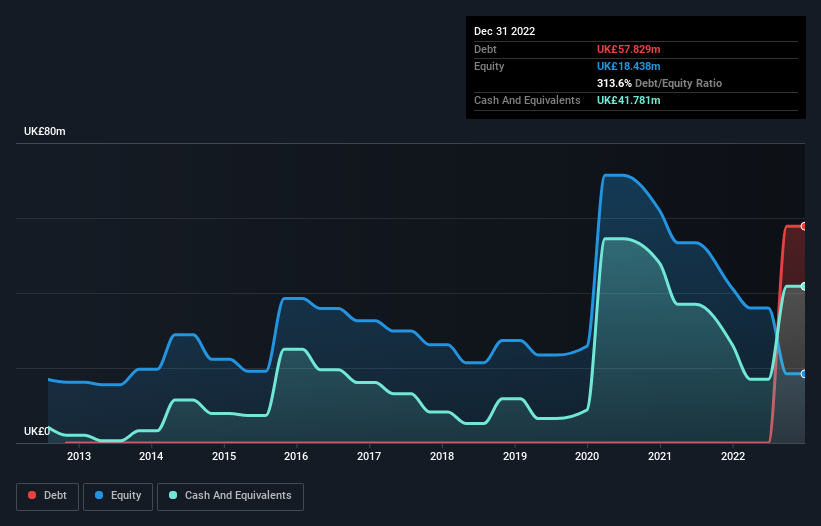
The external fund manager backed by Berkshire Hathaway's Charlie Munger, Li Lu, makes no bones about it when he says 'The biggest investment risk is not the volatility of prices, but whether you will suffer a permanent loss of capital.' It's only natural to consider a company's balance sheet when you examine how risky it is, since debt is often involved when a business collapses. Importantly, Avacta Group Plc (LON:AVCT) does carry debt. But is this debt a concern to shareholders?
Why Does Debt Bring Risk?
Debt assists a business until the business has trouble paying it off, either with new capital or with free cash flow. If things get really bad, the lenders can take control of the business. However, a more common (but still painful) scenario is that it has to raise new equity capital at a low price, thus permanently diluting shareholders. Having said that, the most common situation is where a company manages its debt reasonably well - and to its own advantage. The first thing to do when considering how much debt a business uses is to look at its cash and debt together.
View our latest analysis for Avacta Group
What Is Avacta Group's Net Debt?
You can click the graphic below for the historical numbers, but it shows that as of December 2022 Avacta Group had UK£57.8m of debt, an increase on none, over one year. However, it also had UK£41.8m in cash, and so its net debt is UK£16.0m.

How Healthy Is Avacta Group's Balance Sheet?
We can see from the most recent balance sheet that Avacta Group had liabilities of UK£67.6m falling due within a year, and liabilities of UK£6.60m due beyond that. On the other hand, it had cash of UK£41.8m and UK£10.3m worth of receivables due within a year. So it has liabilities totalling UK£22.1m more than its cash and near-term receivables, combined.
Of course, Avacta Group has a market capitalization of UK£313.6m, so these liabilities are probably manageable. Having said that, it's clear that we should continue to monitor its balance sheet, lest it change for the worse. There's no doubt that we learn most about debt from the balance sheet. But it is future earnings, more than anything, that will determine Avacta Group's ability to maintain a healthy balance sheet going forward. So if you want to see what the professionals think, you might find this free report on analyst profit forecasts to be interesting.
Over 12 months, Avacta Group reported revenue of UK£9.7m, which is a gain of 228%, although it did not report any earnings before interest and tax. That's virtually the hole-in-one of revenue growth!
Caveat Emptor
Despite the top line growth, Avacta Group still had an earnings before interest and tax (EBIT) loss over the last year. To be specific the EBIT loss came in at UK£26m. When we look at that and recall the liabilities on its balance sheet, relative to cash, it seems unwise to us for the company to have any debt. So we think its balance sheet is a little strained, though not beyond repair. However, it doesn't help that it burned through UK£17m of cash over the last year. So suffice it to say we consider the stock very risky. There's no doubt that we learn most about debt from the balance sheet. But ultimately, every company can contain risks that exist outside of the balance sheet. For example Avacta Group has 4 warning signs (and 1 which makes us a bit uncomfortable) we think you should know about.
When all is said and done, sometimes its easier to focus on companies that don't even need debt. Readers can access a list of growth stocks with zero net debt 100% free, right now.
If you're looking to trade Avacta Group, open an account with the lowest-cost platform trusted by professionals, Interactive Brokers.
With clients in over 200 countries and territories, and access to 160 markets, IBKR lets you trade stocks, options, futures, forex, bonds and funds from a single integrated account.
Enjoy no hidden fees, no account minimums, and FX conversion rates as low as 0.03%, far better than what most brokers offer.
Sponsored ContentNew: Manage All Your Stock Portfolios in One Place
We've created the ultimate portfolio companion for stock investors, and it's free.
• Connect an unlimited number of Portfolios and see your total in one currency
• Be alerted to new Warning Signs or Risks via email or mobile
• Track the Fair Value of your stocks
Have feedback on this article? Concerned about the content? Get in touch with us directly. Alternatively, email editorial-team (at) simplywallst.com.
This article by Simply Wall St is general in nature. We provide commentary based on historical data and analyst forecasts only using an unbiased methodology and our articles are not intended to be financial advice. It does not constitute a recommendation to buy or sell any stock, and does not take account of your objectives, or your financial situation. We aim to bring you long-term focused analysis driven by fundamental data. Note that our analysis may not factor in the latest price-sensitive company announcements or qualitative material. Simply Wall St has no position in any stocks mentioned.
About AIM:AVCT
Avacta Group
Develops cancer drugs and in vitro diagnostics in the United Kingdom, France, North America, South Korea, rest of Europe, and internationally.
Mediocre balance sheet low.
Similar Companies
Market Insights
Community Narratives



